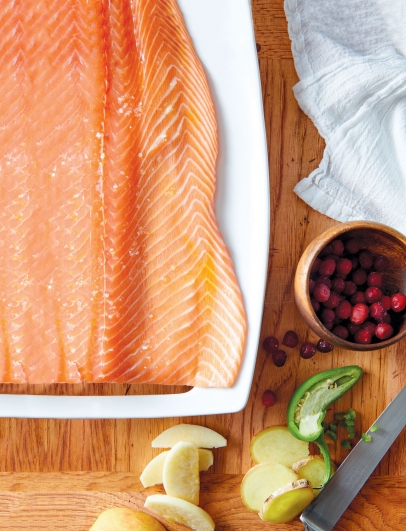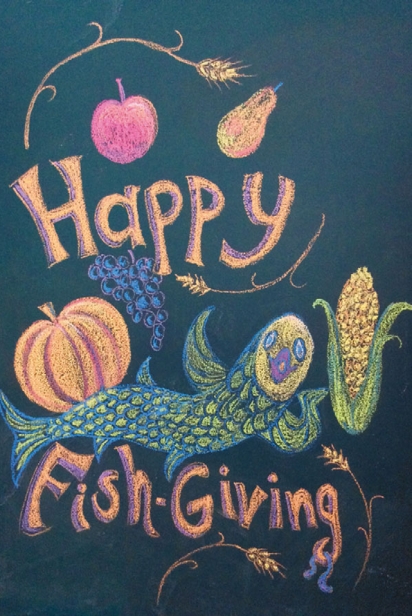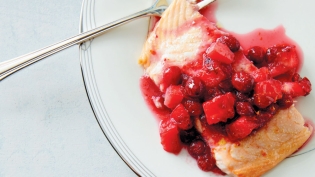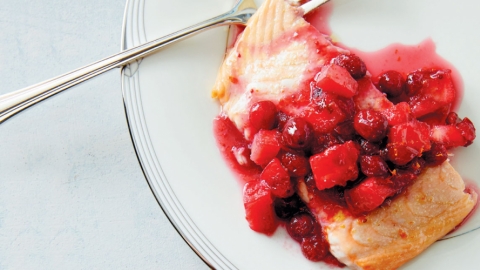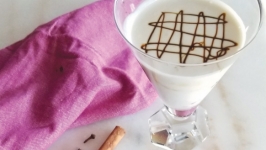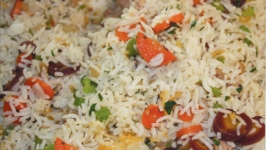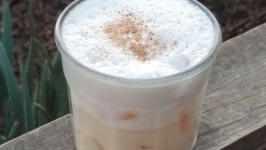Fins over Feathers
How I learned to stop swimming upstream
I’ve long had a challenging relationship with Thanksgiving, more blues riff than golden Norman Rockwell glow. Thankfully, the holiday’s lack of warmth for me has been made up with cooking’s welcome distractions. Keeping busy in the kitchen has always helped me face the chronic struggle with the concept of family, while feeding my larger hunger for community.
When I was small and as impressionable as a pile of mashed potatoes, Thanksgiving was always great: a table laden with white linen, china, etched crystal goblets; the shining mahogany bird ripe for carving; cranberry sauce, stuffing, gravy, mincemeat and pumpkin pies, all from scratch; and the lingering delights of turkey sandwiches for days after. My mother spent great gobs of time on the effort and it was my favorite holiday menu.
Then came the divorce and, like my dad, Thanksgiving pretty much went away. It became a fitful day off from school, too many empty hours. Friends couldn’t play past mid-afternoon, having to go home to their families for their iconic dinner: that bird, those sides. Except for my siblings and me. The following day, my sister would drive my brother and me 140 miles round trip for leftovers at my dad and stepmother’s. Her cranberry sauce was served in the shape of the can it came in. The crimson tube of jelly did have its novel charms; still, memories of those meals remain drenched in pathos gravy.
Cut to adulthood, a newlywed trying to establish my own traditions in my own house in a new town. Naively, I began by inviting all of my lone acquaintances from work. None of them accepted, with at least one memorably saying they preferred the company of their dogs that day. Ouch.
Mixed in between were all the exhausting years we traveled north to my home territory for dinner with the fractious members of my birth family. I eventually decided that some people create families just to have a crowd for that day. If I do elect to host the holiday, I have at last learned to judge who amongst our circle of friends would care to join us. I know not to ask those otherwise- well-adjusted close pals who never discuss what they do for dinner that day. I know, too, who is likely to bail last minute, making our table slightly less groaning.
One year I did the Gourmet magazine cover menu from openers to end. It was grand. Our friends and my two young stepsons were at the table—dining, I fear, on my resentment—when my sacrificial offerings didn’t thaw their chill. I learned to lighten up and give us all a break. Then there was the year I physically abused myself with the brining trick, a recipe from a food writer who claimed his was better than Alice Waters’. After brining in a canning kettle for 18 hours or so, this technique required giving the roasting bird a quarter turn every 15 minutes for hours. Everybody loved the results—except my shoulders, which ached for days after.
Every few years we find ourselves forsaking the private ritual for public display with restaurant reservations. The last time we did this, not that long ago, it was just my husband and me at a former hunting lodge in a lovely wooded Southern California canyon. In the midst of the meal, it finally dawned on me: I didn’t have to feel sorry for myself or anyone else there that day. I simply chose to believe everyone, including us, was doing fine. The harried but smiling servers, the subdued diners, were all happy to be enjoying the fine foods and drink. Once I finally turned that narrative around, a heavy residue of failure, shame and longing fell away like some psychic caul. The breakthrough only took decades of therapy and modest helpings of meditation to achieve.
I feel like I’ve had enough practice now to survive Thanksgiving relatively unscathed. I’ve decided the greatest way to avoid Thanksgiving angst is to just chill. Let it go.
I’ve extended this lesson into the animal kingdom. Last year we gave turkeys something to be thankful for with our inaugural Fins Over Feathers Fish-Giving Dinner. Six of us enjoyed roasted salmon with homemade pomegranate molasses. Our guests brought the traditional sides of Brussels sprouts, potatoes and yams. It was a relief to no longer participate in the ritual roasting and eating of those dim-witted, overly bred, big birds. This year we’re again doing salmon, but with a spiced cranberry-apple-orange relish (recipe at left.)
The change for us was inevitable. Over the past few years, we’ve turned away from what I refer to as industrial-raised protein. The horrendous treatment of cattle, pigs and chickens on large-scale farms finally got to us. We’d heard too many horror stories about caged “free-range” chickens and smart pigs meeting miserable ends. Then there were the health concerns. Animals fed antibiotics to speed their growth are making humans sick. I tried for a while to go the organic, humanely raised route, telling myself that the creature whose flesh graced my plate had lived a good life, dying on the farmer’s couch while watching the premium cable TV package.
Then I decided I really didn’t want to eat the flesh of warm-blooded things anymore. It helped that a woman in our community annually rescued a pair of turkeys which she bathed, groomed and let strut in her front yard. They looked to be enjoying themselves. I envied their joie de vivre. Other pescatarians, which is what we now identify as, and vegetarians pulled over their cars and talked diets with us in front of the woman’s white picket fence.
I know a case can be made for seafood as sentient beings, but in the name of getting enough protein I’m turning a deaf ear. I have recently read extraordinary claims made for the intelligence of octopus. If you know any, you can tell them they’re safe—I have never much cared for their tentacles.
One of the best things about fish for Thanksgiving: It can be cooked in minutes rather than hours. Instead of killing yourself in the kitchen, you can enjoy your guests. Now that’s something to be truly thankful for.


